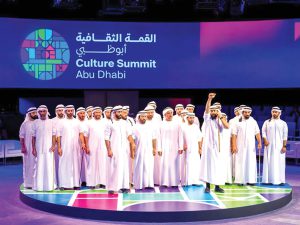ABU DHABI / WAM
The seventh edition of Culture Summit Abu Dhabi concluded today following three days of high-level keynotes, panels, performances and workshops exploring the theme “Culture for Humanity and Beyond”. Organised by the Department of Culture and Tourism – Abu Dhabi, the event brought together over 3,700 attendees, 300 participants, 200 speakers and more than 100 sessions, representing over 90 countries.
Opening on April 27, the Summit examined the role of culture in an era of global transformation, with a focus on digital innovation and artificial intelligence. The programme spotlighted how the cultural and creative industries are adapting policies, practices and ethics to address the rapid evolution of AI, biotechnology and digital ecosystems.
In his opening remarks, Mohamed Khalifa Al Mubarak, Chairman of DCT Abu Dhabi, said culture is foundational to Abu Dhabi’s development, noting, “These gatherings matter more than ever, as they offer us the opportunity to chart a path towards a more sustainable and human-centred global society — with culture as its compass.”
On day two, Sheikh Salem bin Khalid Al Qassimi, Minister of Culture, affirmed the enduring role of culture in shaping societies and guiding innovation. “Culture remains our enduring guide — transforming ideas into action, inspiring communities, and ensuring that creativity remains at the heart of human progress,” he said.
A key highlight was the 2025 MONDIACULT Ministerial Dialogue, co-organised with UNESCO. Culture ministers addressed the intersection of AI and creativity, exploring its impact on rightsholders, youth engagement, and the preservation of heritage. Al Mubarak noted that the collaboration underscored the growing recognition of culture as a governmental priority that transcends sectors and accelerates sustainable development.
AI emerged as a central theme across sessions. On day one, Mo Gawdat, author and former Chief Business Officer at Google X, warned of the challenges posed by AI despite its utility. A panel on human creativity emphasised that while AI is capable, it lacks the inspiration inherent to human art. Additional discussions featured perspectives from jewellery designer Lama Hourani, Dubai Opera’s Paolo Petrocelli, and designer David Korins, who framed disruption as a catalyst for innovation. Other sessions explored AI’s role in amplifying creativity rather than replacing it, with insights from Riyad Joucka, Stephen King, Imad Mesdoua and Dr Patrick Noack.
The Summit also addressed the evolving relevance of museums and arts institutions, the intellectual power of fashion, and non-human-centred design thinking. Keynotes were delivered by Susan Buck-Morss, Glenn D. Lowry, Sir William Sargent, and Iyad Rahwan. Cultural performances included appearances by Ibrahim Maalouf, Kinan Azmeh and Kyle Sanna, Angélique Kidjo, Qusai Al Mamari, and traditional Emirati groups presenting Al-Ayyala and Al-Azi.
The Summit was hosted by DCT Abu Dhabi in partnership with UNESCO, The Economist Impact, Google, the Design Museum, the Recording Academy, and others. It reflects DCT Abu Dhabi’s mission to preserve the emirate’s cultural heritage and foster creativity as a foundation for inclusive, sustainable global progress.
 The Gulf Time Newspaper One of the finest business newspapers in the UAE brought to you by our professional writers and editors.
The Gulf Time Newspaper One of the finest business newspapers in the UAE brought to you by our professional writers and editors.
